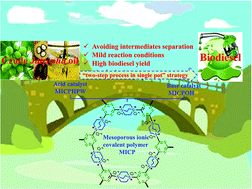Synergetic combination of a mesoporous polymeric acid and a base enables highly efficient heterogeneous catalytic one-pot conversion of crude Jatropha oil into biodiesel†
Abstract
Green and efficient transformation of crude non-edible oil with a high acid value into biodiesel in one-pot under mild conditions is desirable but challenging. Herein, we created a synergistic catalytic system consisting of novel mesoporous polymeric acid (MICPHPW) and base (MICPOH) catalysts to transform crude Jatropha oil (13.0 mg KOH per g) into biodiesel via a “two-step process in single pot” strategy. The novel acid (MICPHPW) and base (MICPOH) catalysts were fabricated facilely via an anion exchange of a mesoporous ionic covalent polymer (MICP) with H3PW12O40 (HPW) and KOH, respectively, where the MICP was synthesized from cheap and readily accessible chemicals using a template-free method. The acid (MICPHPW) and base (MICPOH) catalysts were systematically characterized and exhibited outstanding properties such as a rich mesoporous structure, high acid/base density (4.2 and 3.8 mmol g−1), strong acid/base sites and highly dispersed active sites. These outstanding properties endowed the catalysts with high activity, which was superior to those of diverse acid and base catalysts. High biodiesel yields were obtained by MICPHPW-catalyzed esterification of oleic acid (98% yield) and by converting crude Jatropha oil (92% yield) through the synergistic catalysis of MICPHPW and MICPOH catalysts in one pot under mild conditions. The kinetics and thermodynamics of MICPOH-catalyzed transesterification were also explored. Notably, the MICPHPW and MICPOH catalysts were robust, heterogeneous, and still maintained high activities after four consecutive cycles. The efficient synergistic catalytic system increases the economic feasibility and environmental benefits of biodiesel production.



 Please wait while we load your content...
Please wait while we load your content...